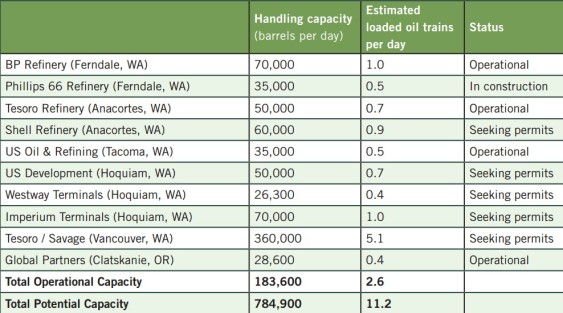Editor’s note: this blog post was updated on February 19, 2014.
Yesterday Sightline published a new analysis on all the oil-by-rail projects planned and underway in the Northwest. The breakdown looks like this:
Focus on the second-to-last line. The Tesoro/Savage project at the Port of Vancouver, Washington, is huge. At 360,000 barrels per day, it’s bigger than many pipelines. It’s nearly as big as all the other projects put together.
And it’s not a done deal.
The Port’s first public meeting with the project proponent is this Thursday, June 27th at 9:30 a.m. Columbia Riverkeeper is encouraging people to attend and raising tough questions about the plans.
There are, indeed, some puzzling dimensions of that project.
Consider that Vancouver, Washington, is not near any refinery. So US crude oil—which by law can only very rarely be exported—would have to be off-loaded from rail cars and then re-loaded onto barges or vessels that would travel to refineries in Puget Sound, the Bay Area, or maybe Hawaii. Any of those routes may raise concerns about the risk of oil spills in marine environments.
Or perhaps the US will lift the near-ban on US crude exports. (In fact, any number of oil industry surrogates and right wing groups are already advocating an end to the ban.) If so, the Northwest could be transformed into a major transshipment point for mid-continental oil bound for markets in Asia.
Or perhaps the Vancouver site will be used for off-loading large quantities of Canadian tar sands oil, which is not subject to the US export ban. (Many argue, though, that it doesn’t pencil to move tar sands oil on trains because of the additional cost of rail cars makes the already-expensive oil uneconomical.) If so, projects like the one at Vancouver could in effect become a replacement for the tar sands pipeline capacity—Northern Gateway, Trans Mountain expansion, and Keystone XL—that industry has struggled to add in the face of public opposition and controversy.
It’s conceivable that the Northwest might avoid new pipelines but instead get thousands of oil trains traversing the region each year.
If you’re in the Vancouver, Washington, area, it’s probably worth attending the meeting on Thursday.









Don Steinke
Oil shipments are almost as bad as coal exports. These shipments will:
1. Lock us in to continued dependence on oil and associated harm.
2. Allow releases of methane from fracking in North Dakota
3. Increase if Congress allows exports of domestic oil.
4. Allow tar sands.
5. Lead to irreversible global warming and game over.
Alan Locklear
An argument is being made that there is no way that the planet can burn all the carbon fuel reserves claimed by the companies which own them because the climate damage would be severe almost beyond measure. Therefore, the market value of these companies (which is largely based on their reserves) is illusory. It seems that at least some of these companies have recognized that and have decided their best strategy is to extract and sell their reserves as fast as possible (i.e. faster than their competitors), so that when people finally put the brakes on carbon burning, they won’t be the ones left sitting on huge, unburnable reserves. That theory goes a long way toward explaining the almost manic efforts by coal, oil and gas interests to extract and sell, even by exporting if necessary, their reserves as fast as possible.
Dave Kisor
I hope they don’t have many derailments, but unfortunately it comes with the territory.
Alan Locklear
One way to slow down this rush to extract our carbon fuel resources and ship them overseas might be to require the railroads to build their trackage to something better than early 20th century standards. For chrissakes, they’re still building railroad lines with wooden ties in this country. This, while the trains get heavier and longer and more laden with toxic crap. Derailments happen because tracks aren’t build to handle the level of use they get. Under the current economic regime, railroad companies can more easily afford cleaning up and repairing damage from derailments than they would have to spend to upgrade their trackage. The environmental damage caused by derailments is rarely completely ameliorated and sometimes completely ignored.